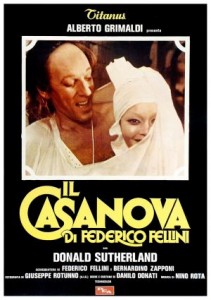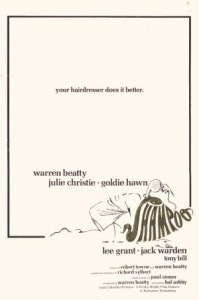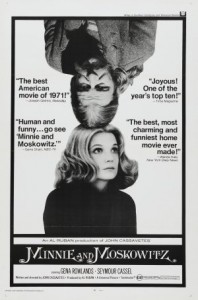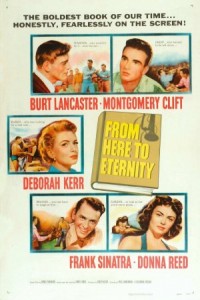Fellini’s Casanova [1976, Federico Fellini] (5.0)
An occasional visual stunner that mostly permeates in my memory as an interminably obnoxious act of sadism toward the audience. Not in the torture porn sense of sadism, but in the kind such as approximating a fascinating film but with enough of an err toward crap that it causes a unique sort of spasm in the cerebral cortex. Casting Donald Sutherland was a true masterstroke, as he embodies everything that is right and wrong with this film in just one of his sweaty pelvic trusts.
Shampoo [1975, Hal Ashby] (7.3)
Will need to re-watch, but about an hour in I realized that I was in a bit of a subtle trance state, just watching these people do not much other than each other. Then came the euphoria of the election night parties, and that strobe light, and it was the most banal kind of bliss I’ve experienced in some time. The ending is affecting, but felt a tad too calculated.
Minnie and Moskowitz [1971, John Cassavetes] (6.3)
Cassavetes’ way of allowing scenes to ramble looooong past what any studio director would be allowed, or allow himself, is married to a funky kind of ellipsis in the first half that nearly left my mouth agape. I spent the first half hour trying to detect whether the projectionist had mixed reels (and I’m still not convinced that they weren’t out of order; the opening credits get cut short and then resume about 15 minutes later – anyone? intentional?) and finally succumbed to the ride. These people are insane, under the influence if you will, and I had so much pleasure watching their tirades linger on the screen before getting cut off, sometimes mid-sentence, only to return an hour later (maybe), that I didn’t really notice that they’re actually pretty thinly sketched. The second half gets considerably more straight forward as we focus on Minnie and Moskowitz – I guess this was to be expected – and I realized that I was probably supposed to care for these people a lot more than I actually did.
From Here to Eternity [1953, Fred Zinnemann] (6.1)
Perhaps it didn’t know what to do with itself tonally, but I thought that was one of the more compelling things about it. Why was a romance triangle built with Deborah Kerr if she is going to almost completely disappear in the film’s second half? Why shift from an endearing and selfless act of revenge in an alley into a full scale Pearl Harbor war picture? Who cares? It made the hammy elements of each detour at least formally tolerable.




